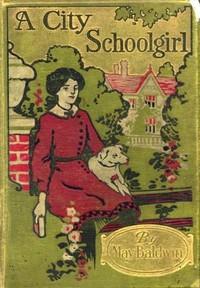Read this ebook for free! No credit card needed, absolutely nothing to pay.
Words: 113347 in 27 pages
This is an ebook sharing website. You can read the uploaded ebooks for free here. No credit cards needed, nothing to pay. If you want to own a digital copy of the ebook, or want to read offline with your favorite ebook-reader, then you can choose to buy and download the ebook.
of which it was capable. And had she bought relief and freedom by such a sacrifice exacted from another? When comforters bid her believe that he had gone to a better place, that it was her loss but his gain,--which in all probability is true in all cases, not only in those of the saints whose natural home is heaven,--her heart rose against them, and contradicted them, though she said nothing. It was--alas that it should be so!--her gain. She dared not, even to herself, deny that; but how could it be his--a man who had no thought but of the beggarly elements of life, no aspiration beyond its present enjoyments? and it was by this dreadful overturn in his existence, this taking from him of everything he cared for, that she had been made free. Such a thought as this is more terrible than sorrow, it is sadder than death. It left her for a long time very grave, full of something which was almost remorse, as if she had done it; wondering whether God himself could make up to poor Geoffrey, who had never thought of Him, for the loss of everything which he had ever thought of or cared for. She could not confide this thought to any spiritual guide,--and indeed she was not a woman to whom a spiritual guide was possible. Her problems, her difficulties, remained in her own breast, where she worked them out as she could, or, perhaps, in process of time, forgot them, which, in the darkness of human understanding, was probably the better way.
But in one respect he had been just, nay, generous, to his wife. He had left the burdened estates, the no-money, the guardianship of her child, entirely to her. His old uncle, indeed, was associated with her in that guardianship; but this was merely nominal, for old John Markland was very indifferent, more interested in his own comforts than in all the children in the world, and had no mind to interfere. She found herself thus not only a free woman, but with what was equal to a new profession upon her shoulders,--the care of her boy's fortune and of considerable estates, though at the moment in as low a condition and as badly managed as it was possible for estates to be. It was not the fault of Mr. Longstaffe, who had all the business of the county in his hands, and who had tried in vain to save from incumbrance the property which Lord Markland had weighed down almost beyond redemption. Mr. Longstaffe, indeed, when he heard of the fatal accident to his client, had been unable to refrain from a quick burst of self-congratulation over a long minority, before he composed his countenance to the distress and pity which were becoming such an occasion. When the funeral was over, indeed, he permitted himself to say piously that, though such an end was very shocking, it was an intervention of Providence for the property, which could not have stood another year of Lord Markland's going-on. He was a little dubious of Lady Markland's wisdom in taking the burden of the business upon her own shoulders; but on the whole he respected her and her motives, and gave her all the help in his power. And Lady Markland let no grass grow under her feet. She began proceedings at once with an energy which nobody had expected from her. The horses were sold, and the establishment reduced without any delay. The two other houses, both expensive,--the villa in the Isle of Wight, the shooting-box in the Highlands,--both of which had been necessary to Lord Markland's pursuits, were let as soon as it was possible to secure tenants. And Geoff and his mother began, in one wing of the big barracks at Markland, a life not much different from their past life, except in so far that it was free from interruption and anxiety. The pang of loss in such a case does not last; and Lady Markland entered with all the zest of an active-minded and intelligent woman into the work from which she had been debarred all her previous life. No man, perhaps,--seeing that men can always find serious occupation when they choose to do so,--can throw himself with the same delight into unexpected work as such a woman can do, a woman to whom it is salvation from many lesser miseries, as well as an advantage in itself. She had known nothing hitherto, except that everything was going badly, and that she was helpless to interfere, to arrest the ruin which stared them in the face. And now to feel that she might stop that ruin, might even make up for all the losses of the past, and place her son in the position his father had lost, was a happiness beyond description, and gave new life and exhilaration to all her thoughts.
Geoff, however, without being as yet quite clear in his mind as to his grievance, had instinctively taken what means were in his power to make up for it. There was that robbers' cave, for one thing, which had many dramatic possibilities. And he was a boy who took a great interest in his fellow-creatures, and liked to listen to talk, especially when it was of a personal character. He was delighted to be there, notwithstanding the strange silence to which he was condemned, when Dickinson, the bailiff, came in to make his report and to receive his orders. Geoff took the greatest interest in Dickinson's long-winded stories about what was wanted in the village, the cottages that were tumbling to pieces, the things that must be done for the farmers. Lady Markland was at first greatly amused and delighted to see how her boy entered into everything, and even made a gentle boast that Geoff understood better than she did. It was only when Mr. Longstaffe and her clergyman simultaneously snubbed her that this foolish woman came to herself. Mr. Longstaffe said, in his brusque way, that he thought Master Geoff--he begged his pardon, little Lord Markland--would be better at his lessons; while Mr. Scarsdale put on a very grave air, and remarked that he feared Dickinson might have things to tell his mistress which were not fit for a little boy's ears. This last address had disconcerted the young mother sadly, and cost her some tears; for she was as innocent as Geoff, and the idea that there were in the village things to tell her that were unfit for the child's ears threw her into daily terror, not only for him, but for herself. This was one of the things that made it apparent that a new rule was necessary. Her business grew day by day, as she began to understand it better, and the lessons fell more and more into the background. Geoff was the soul of loyalty, and did not complain. He developed a quite new faculty of silence, as he sat at his table in the window, now and then stealing a glance at her to see if she were free. That little figure, seated against the light, was all that Lady Markland had to cheer her, as she set out upon this new and stony path of life. He represented everything that made her task possible and her burden grateful to her. Without him always there in the background, what, she asked herself, would existence be to her? She asked herself this question when it first began to be suggested by her friends that Geoff should be sent to school. It is one special feature in the change and downfall that happens to a woman when she becomes a widow that all her friends find themselves at liberty to advise her. However bad or useless her husband may be, so long as he lives she is safe from this exercise of friendship; but when he is dead all mouths are opened. Mr. Scarsdale paid her a visit solemnly, in order to deliver his soul in this respect. "I came on purpose," he said, as if that was an additional virtue, "to speak to you, dear Lady Markland, very seriously about Geoff." And whether it was by his own impulse, or because he was written to on the subject, and inspired by zealous friends nearer home, old Mr. Markland wrote to his dear niece in the same strain, assuring her that it would be far the best thing to send him to school. To school! Her little delicate boy, not nine till April, who had never been out of his mother's care! Lady Markland suffered a great deal from these attacks, and she tried hard, by getting up early, by sitting up late, to find time for Geoff, as of old; but Geoff himself had fallen into the new ways, and the lessons languished. What was she to do?
And then it was that the alternative of a tutor was suggested to her. A tutor! That did not seem so terrible. She confided her troubles to Warrender, who had fallen into the way of riding over to Markland two or three times a week, of checking Dickinson's accounts for her, and looking up little bits of law as between landlord and tenant, and doing his best to make himself necessary; not with any deep-laid plan, but only because to be near her, and serve her, was becoming more and more the desire of his life. Warrender was not fond of Geoff. It is possible, indeed, that his spirits rose with a sense of relief at the suggestion of sending that inevitable third in all their interviews away; but he was at that stage when the wish of a person beloved is strong enough in a young mind to make all endurance possible, and to justify the turning upside down of heaven and earth. He had replied boldly that there would be nothing more easy than to find a tutor; that he himself would go to town, and make inquiries; and that she need contemplate the other dreadful alternative no more. Lady Markland was more grateful to Theo than words could say, and she told all her friends, with a serene countenance, that she had made up her mind to the tutor. It is a great thing to have made up one's mind. It gave a satisfaction and calm to her spirits that nothing else could have done. Indeed, she was so satisfied that she avoided the subject thereafter, and said nothing more to Warrender, who had constituted himself her agent, and took great care not to question him about what he had been doing in London, when she heard that he had been there. For after all, to come to a determination is the great thing. The practical part may be put in operation at any moment. What is really necessary is to make up one's mind.
Something of the same feeling moved Warrender when he returned from that expedition to London, which has been already recorded. Dick Cavendish's suggestion had been to him a suggestion from heaven. But when he returned home, and as he began to think, there were a great many secondary matters to be taken into account. He began to realise the interest that would be taken by the entire county in a matter which did not concern them in the very least. He realised the astonished look of his mother, and felt already his ear transfixed by Minnie's persistent "Why?" Theo saw all these hindrances by degrees. He said to himself, indignantly, that it was nobody's business but his own, and that he hoped he was able to judge for himself. But these reflections do not make an end of a difficulty; they only show more distinctly a consciousness of it. And thus it was that he put off making to Lady Markland the proposal he intended to make, just as she, on her side, put off asking him whether he had done anything in the matter. In the meantime, while the summer lasted, there were many reasons and excuses for putting off from day to day.
Theo paused a moment, and cast a glance round them all. Then he answered in a voice which seemed louder than usual because it was somewhat defiant. "I don't know," he said slowly; "and if you want the truth, I don't care."
"Theo!" cried Minnie, with a little scream. Chatty, who had been contemplating at her ease, when this conversation began, the bubbles rising in a glass of aerated water which she was holding up to the light, set it down very quickly, and gave him an appealing look across the table. Mrs. Warrender looked at him too, pretending, poor lady, not to understand. "But, my dear," she said, "we must get everything ready; so it is very necessary to know."
"There is nothing to be got ready, so far as I am aware," he replied, with a flush on his face, and the look of a man who is making a stand against his opponents. "I am not going up this term, if that is what you mean."
Then all three looked at him with different degrees of remonstrance, protest, or appeal. Mrs. Warrender was much too sensible of her incapacity to prevail against him to risk any controversy. And even Minnie was so confounded by the certainty of his tone that, except another resounding "Theo!" the tone of which was enough to have made any man pause in an evil career, she too, for the moment, found nothing to say.
"My dear, don't you think that's a great pity?" his mother remarked very mildly, but with a countenance which said much more.
"I don't wish to discuss the question," he said. "I thought I had told you before. I don't mean to be disagreeable, mother; but don't you think that in my own case I should know best?"
"Theo!" cried Minnie for the third time, "you are more than disagreeable; you are ridiculous. How should you know best,--a boy like you? You think you can do what you like because poor papa is dead, and we are nothing but women. Oh, it is very ungenerous and undutiful to my mother, but it is ridiculous too."
Free books android app tbrJar TBR JAR Read Free books online gutenberg
More posts by @FreeBooks











